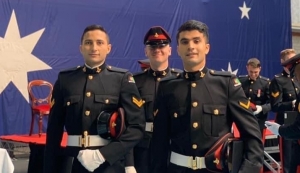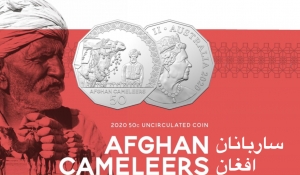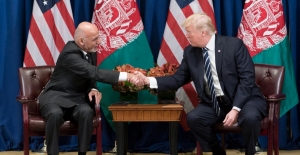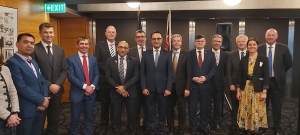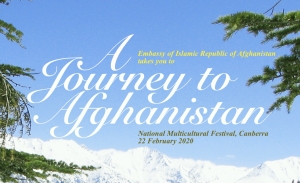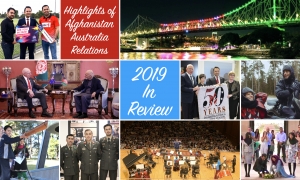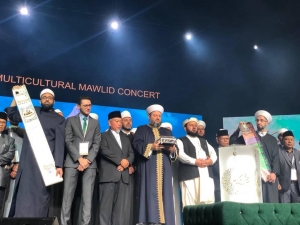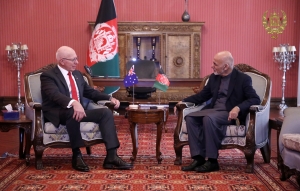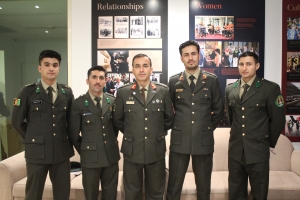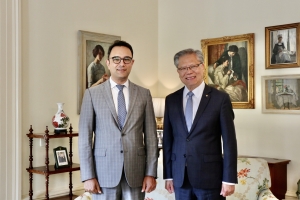Canberra, 30 April 2020
Two Afghan cadets, Bazmohammd Watandost and Siavash Saduqi, were successfully graduated from Royal Military College RMC-Duntroon Army Officer Commissioning Course 2020 among over 90 cadets from Australia and 6 other countries.
The graduation ceremony convened with attendance of high-ranking Australian military officers amid the COVID-19 restrictions on 28 April 2020 at RMC, Canberra. The Embassy of the Islamic Republic of Afghanistan was represented by Counsellor Mr Balagh at the said ceremony.
Australian Chief of Army, Lieutenant General Rick Burr, AO, DSC, MVO while awarding graduation certificates to graduands said: “As we move into a challenging global environment, I am proud of the officers and staff for demonstrating a commitment to the service of their nations.”
So far, three Afghan cadets have graduated from Duntroon as part of an 18 months military studies course fully-funded by the Australian Government.
In 2019, the first two Afghan cadets were graduated from Duntroon which is one of the top military colleges worldwide. Last year also marked the graduation of two Afghan higher military officers from Australian Defence College at the levels of colonel and major respectively.
This year’s Afghan graduated cadets will be replaced by two other Afghans in January 2021. One of them will be the first Afghan female cadets to study at the Australian Royal Military College.
Celebrating Australia’s pioneering Afghan Cameleers, the Royal Australian Mint has released two limited edition 50 cents coins (2500 each), in silver ($85) and Copper-Nickel ($10). The coin carries the new Jody Clark portrait of Queen Elizabeth II on the other side.
"With camels far more suited for transport and exploration than horses or bullocks, half the Australian population relied on Afghan cameleers for survival at one stage during the 19th century. An official issue of the Royal Australian Mint, this Silver Proof 50c coin forms a striking tribute to these Aussie pioneers", stated in the Royal Australian Mint website.
Not only eye-catching, the 2020 50c Afghan Cameleers Silver Proof Coin is also extremely exclusive. Only 2,500 coins have been struck! Beautifully presented within official packaging, each of those coins is housed within a Royal Australian Mint case, united with a numbered Certificate of Authenticity.
In 2019, the Royal Australian Mint has also released a coin for the 90th anniversary of the Ghan Train, a legacy of the Afghan Cameleers and their contribution to the Adelaide-Alice Spring railway construction.
The Embassy of the Islamic Republic of Afghanistan in Canberra thanks the Royal Australian Mint for these recognition and timely release of these exclusive coins.
Both Afghanistan and Australia have celebrated the 50th anniversary of their diplomatic relations (1969-2019).
For more details please visit: https://www.downies.com/2020-50c-afghan-cameleers-cuni-uncirculated-coin
Photo credit: The Royal Australian Mint
Australina Views of the US-Taliban PeaceAgreement: Motivations and Implications
INTRODUCTION
While some cautious, conditional optimism exists in the Australian academic analyses of the 29 February Peace Agreement between the United States and the Taliban, the prominent sentiment is one of doubt and distrust of the motives and consequences of the deal. Academic perspectives of President Trump’s push for signing a deal with the Taliban revolve around his re-election campaign, and the popularity boost that withdrawing troops from Afghanistan may create. It is suggested that the Taliban wishes to capitalise on the USA’s willingness to exit Afghanistan, in order to perhaps mount a further offensive against the Kabul government, as well as gaining prestige through a bilateral agreement with the US. The content of the agreement itself has attracted strong criticism, especially its lack of inclusion and support of the Afghan government, and absence of any long-term intra-Afghan ceasefire. Interpretations of the implications of this deal for Afghanistan are bleak. Continuing Taliban attacks suggest that the militia will capitalise on fewer NATO troops, and the already weakened Kabul government, to increase its bargaining power and advance its goals.
MOTIVATIONS
It is suggested that the motivations of the Trump Administration to sign such an agreement with the Taliban stem from President Trump’s 2016 campaign promise to end the American involvement in Afghanistan. Professor William Maley suggests that Trump’s motivation in reaching this agreement undoubtedly meets his electoral needs, as he has long harboured “an instinctive disposition to cut and run from Afghanistan”. Furthermore, it is apparent that the long-lasting nature of American, and by extension Australian, involvement in Afghanistan has made the public weary of continuing casualties of coalition troops in Afghanistan. Richard Haass states that “Donald Trump wants to be able to claim in advance of the November election that he fulfilled his campaign promise to end the country’s longest war”. Farkhondeh Akbari describes the withdrawal as a “political necessity”. Niamatullah Ibrahimi of Deakin University also notes that American and Australian political circles
have embraced this apparent opportunity to end their involvement in “one of the world’s most debilitating and protracted conflicts”. He also goes on to suggest that the US-Taliban agreement “is merely a cheap withdrawal troop agreement intended to serve US President Donald Trump’s political interests during an election year”.
Australian media and academic circles believe American domestic politics, specifically President Trump’s attempts at re-election, to be fundamental in their motivations for an agreement with the Taliban.
It appears that there is scholarly consensus that the Taliban has entered and come out of the agreement with the United States with distinct advantage and increased symbolic and political power. According to Professor Maley, the Taliban view the United States as “a weakened power, heading for the door”, a fact that is proven by substantial concessions the US made during the negotiations.
The apparent betrayal of the Kabul government by the US is also heavily criticised in Australian media and academic publications, with many likening it to the American withdrawal of support for the Kurds in Syria. Consequently, many identify the elevation of the Taliban to an “equal” negotiating status with the US as a legitimising precedent for the militia.
Haass highlights the possibility that the Taliban is pledging these concessions and negotiating with the US in a tactical manner. He states that it is “all-too-real" that the Taliban is not trying to end the conflict, but simply is attempting to exacerbate the American withdrawal of troops.
Furthermore, Professor Maley argues that fewer American troops would allow the Taliban to escalate attacks on Afghan government forces, hence “enhancing their bargaining position”.He also deems it possible that the Taliban will push for total power in Afghanistan once the withdrawals are complete.
Widespread consensus seems to suggest that while the US has made significant concessions in the agreement, the Taliban has had the benefit of only having “expectations” placed upon them by the US, hence predictably utilising a narrow interpretation of its obligations. It is apparent that throughout the interpretations of the agreement, the view that the Taliban have got the best out of the deal is commonplace.
However, Ian Dudgeon of the Australian Institute of International Affairs, highlights that insights into the inner workings of the Taliban are limited, and that potential factional disputes and the disunity of its leadership may also limit the chances of any lasting peace.
IMPLICATIONS
Academics have not shied away from criticising the content of the agreement either, especially what they consider to be its weak and non-binding nature. Across all the recent commentary on the agreement, a resounding criticism pertains to the exclusion and side-lining of the Afghan government itself, which many deem to be a crucial element of any peace deal in Afghanistan.
Even the most optimistic interpretations remain conditional: That condition being the effective support of the Afghan government’s position in their eventual negotiations with the Taliban.
Professor Amin Saikal of the Australian National University stresses that the only practical solution to the conflict in Afghanistan “was to have had a publicly legitimated and strong government in Kabul to negotiate with the Taliban from a position of strength”.
The fact that the Afghan government was not party to these negotiations, the consequences of the agreement would be highly affected by the delay of decision on its implementation by the Government of Afghanistan as a legitimate party of any peace deal for Afghanistan.
Another key factor that was missing in the agreement was that regarding Taliban bases in Pakistan. As Dr Niamatullah Ibrahimi suggests, it is very unlikely that any peace agreement in Afghanistan will endure with insurgent militia able to freely operate out of installations in Pakistan.
More recent analyses use the Taliban rejection of President Ghani‘s release of only 1500 prisoners, as opposed to the suggested 5000, as well as Taliban hesitation regarding the makeup of Kabul’s negotiation team, as indications that intra-Afghan talks will go nowhere and that violence will soon erupt once more.
The integral components of the US-Taliban agreement, as well as the components it lacks, attract both heated criticism and cynicism from Australian media and scholars.
Predictions and analyses of the significance of the US-Taliban agreement for Afghanistan are varied, however predominantly pessimistic, with many predicting a stronger and emboldened Taliban increasing its activities without Western intervention and support.
Srinjoy Bose in his article published by the Lowy Institute espouses cautious optimism, recalling the relative success of a 2018 ceasefire declared by President Ghani.
The SMH’s Lisa Davies, contends that it is a step in the right direction, but strongly stresses the importance for a continued American presence in Afghanistan in order to persuade the Taliban to share power with the Afghan government. This possibility of a power sharing agreement seems a veritably unpalatable one for many scholars, such as Akbari, who emphasises the Taliban’s brutal violations of human rights during their rule. Ibrahimi also stresses the Taliban’s fundamentalist approach to women’s rights and freedom of expression, which are predicted to suffer under any power-sharing agreement.
Professor Maley espouses the most pessimistic view of the American withdrawal agreement. He likens the American approach to the Taliban as one not dissimilar to Chamberlain’s Britain, appeasing Nazi Germany by standing idly as they annexed Czechoslovakia. Maley’s descriptions in his article for the Australian Institute of International Affairs seem to suggest that a Taliban attempt to capture Kabul, or even Afghanistan in its entirety, is not entirely far-fetched. A common comparison used in several articles is that of the Paris Accords of 1973, which withdrew US troops from Vietnam, ultimately leading to the fall of Saigon 2 years later.
Maley points out that “withdrawal agreements dressed up as peace agreements have a bad history of being dishonoured”.
Lisa Davies goes so far as to say that "choppers could be rescuing US diplomats and Afghan sympathisers from the roof of the embassy in Kabul in a couple of years”.
Policy recommendations for the success of any peace deal revolve around Western military and economic support for the Afghan Government. Western support would obviously have to be long-lasting, especially support for the Afghan state during the ongoing COVID-19 pandemic.
Haass recommends a continuous Western military presence in Afghanistan, to train government security forces and conduct counterterrorism missions. He, despite its expensive nature, contends that it is a "price worth paying”.
Even if a peace agreement is reached between the Taliban and Kabul, Nematullah Bizhan and Professor Maley estimate that in order to keep Afghanistan afloat, increased amounts of foreign aid of up to $8 billion a year are needed to fund services and economic growth. They also stress the necessity of legal reform in order to encourage larger amounts of private investment in the country. However, without these measures, "the consequences could be dire”.
Ian Dudgeon also emphasises Australia’s vested interest in Afghanistan, given the $10.5 billion that it has invested in the country since 2001.
CONCLUSION
Overall, in response to the US-Taliban agreement, Australian journalists and academics permeate cynicism.
The only hope displayed is conditional, based on a series of factors, such as Taliban trustworthiness, an American withdrawal more measured than that of with the Syrian Kurds and continued Western support for the Afghan government.
Scholars deem the likelihood of any meaningful negotiations between Kabul and the Taliban slim, with latter predicted to grow in power and confidence. Long-term predictions for Afghanistan are varied, but there is wide agreement that further Western military and economic links are needed to provide for an acceptable peace.
Canberra Brief: To Access its PDF version, click here.
About the Writer: Ethan Vujanovic is a law and International Relations student of Australian National University. Ethan is doing internship with the Embassy of Islamic Republic of Afghanistan since January 2020.
Disclaimer: The views and opinions expressed in this version are those of the authors and do not necessarily reflect the official policy or position of the Embassy of Islamic Republic of Afghanistan in Canberra or the Government of Afghanistan. Material presented throughout this newsletter is for information purpose and is only as accurate as the sources allow.
Photo: President Mohammad Ashraf Ghani and President Donald J. Trump at the United Nations General Assembly. Source: Australian Institute of International Affairs/Official White House, Photo by Shealah Craighead
SOURCES
Akbari, Farkhondeh. 2020. "A US-Taliban Deal: What Price For Peace?". The Interpreter - Lowy Institute.
Bizhan, Nematullah, and William Maley. 2020. "Is The US-Taliban Agreement A Path To Peace In Afghanistan?". Devpolicy Blog From The Development Policy Centre.
Bose, Srinjoy. 2020. "In Afghanistan, Peace Or Fragmentation?". The Interpreter - Lowy Institute.
Davies, Lisa. 2020. "Trump's Deal With The Taliban Is A Step In The Right Direction". The Sydney Morning Herald.
Dudgeon, Ian. 2020. "The Afghan Peace Talks: Certainties, Uncertainties, And Unknowns". Australian Institute Of International Affairs.
Haass, Richard. 2020. "How To Leave Afghanistan". The Strategist - Australian Strategic Policy Institute.
Ibrahimi, Niamatullah. 2020. "Lasting Peace In Afghanistan Now Relies On The Taliban Standing By Its Word. This Has Many Afghans Concerned". The Conversation.
Maley, William. 2020. "A Chance For Peace Or A Rush To The Exit?". Australian Institute Of International Affairs.
Maley, William. 2020. "Interests, Negotiations, And The US-Taliban Agreement". Afghanistan Center At Kabul University.
Saikal, Amin. 2020. "The US-Taliban Peace Deal". Australian Institute Of International Affairs.
Saxena, Chayanika. 2020. "In The Shadow Of A Pandemic, Political Calamity Grips Afghanistan". The Interpreter - Lowy Institute.
The Parliament of the New Zealand in Wellington was the co-host of the Afghanistan and New Zealand Parliamentary Friendship Group (ANZPFG) in Wellington on March 17, 2020. The Embassy of the Islamic Republic of Afghanistan, as a co-host, welcomed a group of Kiwi politicians, Minister of Defence, Members of Parliament and members of the ANZPFG, dignitaries from departments of Foreign Affairs and Defence, Wellington Mayor, representatives of Afghan community in NZ and friends of Afghanistan to this event.
The Hon Andrew Bayly, the Co-chair of the ANZPFG made a welcoming speech and announced Afghanistan as a new entry within the framework of the New Zealand - Middle East and Africa Parliamentary Friendship Group. He mentioned about Afghanistan and NZ relation and engagement through millitary and developmnet cooperation.
Ambassador of Islamic Republic of Afghanistan, HE Wahidullah Waissi, in his remarks thanked the NZ Parliament for making this major step for establishing, maintaining and expanding closer ties between New Zealand and Afghanistan. Ambassador Waissi paid tribute to NZDF fallen soldiers who lost their lives serving in Afghanistan and express condolences to their families and veterans and to 51 NZ citizens who lost their live as a result of Christchurch terror attack in March last year. He pointed out that NZ and Afghanistan are separated by far distance but both nations have common aspirations towards peace, prosperity and democracy.
It is understood that the New Zealand development assistance since 2003 has been instrumental in much needed sectors in Afghanistan which has been focused on areas such as good governance, agricultural development and renewable energy. NZ has continued assistance is essential in post – peace settlement in Afghanistan beyond 2020 and towards next international donner conference on Afghanistan.
Ambassador Waissi in his remarks said that "there are huge potentials for trade and business-match making between two countries as well. We are looking for export of Afghan goods such as saffron, pomegranates and pine nuts to New Zealand markets. Establishment of joint chamber of commerce and business council will contribute to ease of business between two countries. We are interested to get membership of NZ- Middle East Business Council."
In his speech, Ambassador highlighted the following key areas of cooperation for future consideration:
Availing the presence of nearly 15,000 of Afghans currently residing in New Zealand, we are looking to strengthen people to people links between NZ and Afghanistan. Establishment of a regular p2p dialogue in this context will be helpful.
Afghanistan has one of the youngest populations in the world – with approximately 63 percent of the population below 25 years of age and 46 percent under 15.We look forward for educational cooperation, third country education program and distance learning opportunities for Afghans in NZ universities.
Establishment of Afghan cultural centre with collaboration of Afghan community and support of NZ Government will enables us to foster cultural relations between two countries.
Signing an MoU of city sisterhood between Bamiyan province and either Auckland or Christchurch is something we can envisage. NZ has focussed much of its development assistance through PRT in Bamiyan and Auckland/ Christchurch is hosting the largest number of Afghans in NZ.
We look forward for technical and bilateral cooperation between cricket boards of two countries.The upcoming world cup in Australia will be a good opportunity in this respect.
The last speaker of the event was membrer of the the NZ Parliament, Honorable Duncan Webb. He thanked all participants for their support and commended on the works undertaken by the MEA Friendship Group, which is an important platform for establishing, maintaining and expanding closer ties between nations in the Middle East and Africa now extended to Afghanistan.
Members of New Zealand - Afghanistan Parliamentary Friendship Group
Membership of the committee
Co-chair: Andrew Bayly
Co-chair: Duncan Webb
Chris Bishop
Marama Davidson
Anahila Kanongata'a-Suisuiki
Raymond Huo
Nuk Korako
Melissa Lee
Hon Mark Mitchell
Hon Stuart Nash
Hon Alfred Ngaro
Simon O'Connor
Louisa Wall
Angie Warren-Clark
Harete Hipango
Secretary
Secretary: Aaron Williams
Under-Secretary: Sam Moffett
Email: This email address is being protected from spambots. You need JavaScript enabled to view it.
The Embassy of the Islamic Republic of Afghanistan is proud to announce its participation in the 2020 National Multicultural Festival, to be held on Saturday the 22nd of February.
The National Multicultural Festival is an annual festival organised by the ACT Government which involves hundreds of community groups, national and local businesses and foreign diplomatic missions, amongst others. The Embassy of Afghanistan counts amongst the participants, alongside over 300 stalls from around the world.
2020 marks the third year the Embassy has participated, and this year it looks forward to inviting friends of Afghanistan, business owners, Afghan diaspora communities and all other members of the public and their families to the official stall, which will be located near David Jones in Civic. We also extend a warm welcome to all those who are planning to return to visit us this year.
The highlights of this year’s Festival include, for the very first time, a live music performance of traditional Afghan music and a chance to learn about and hear unique instruments like the rubab and tabla, courtesy of talented Sydney-based Afghan musicians. Visitors will also have the opportunity to watch live Persian calligraphy – and even take home a souvenir.
In addition to these family-friendly activities, there will also be dry fruits, tea and desserts to sample. Alongside this delicious taste of Afghanistan will be displays of colourful traditional clothing, jewellery and carpets; a chance to travel through different regions of Afghanistan
This year’s Multicultural Festival promises to be an exciting and eye-opening experience, welcoming everyone to enjoy some of what the rich culture and diversity of Afghanistan has to offer.

Highlights of Afghan-Australian Relations in 2019
2019 has been a busy and rewarding year at the Embassy of the Islamic Republic of Afghanistan in Canberra, as it celebrated two important milestones. The 50th anniversary of the establishment of bilateral relations between the Islamic Republic of Afghanistan and the Commonwealth of Australia, alongside the 100th anniversary of Afghanistan’s Reclamation of Independence, were marked by a series of activities, visits and events throughout the year. It is my pleasure to reflect on this calendar and look back on what Australia and Afghanistan have achieved.
The two countries share a friendly and long-standing relationship which can be traced back as far as the 1860s, when Afghan cameleers came to Australia to contribute to exploration and transportation for the wool and mining industry and the development of Australia’s vast interior. Today, Australia has provided generous assistance of over a billion dollars, which has made an enormous difference to the conditions of children and women, and to the opportunities provided to our youth.
Our relationship continues to flourish through continued engagement in security and development cooperation, and economic reform through bilateral, regional and multilateral dialogues. This has also been supported by the developments in people-to-people links, particularly in the fields of sports, arts and culture; reflected in the range of events and celebrations over the course of 2019. These include Afghan cricket star Mohammad Nabi’s launch of his first International Cricket Academy in Melbourne at the beginning of the year, the Afghan community’s initiative and participation in the Fashions of Multicultural Australia exhibition in February, and the graduation of three of the first Afghan cadets from the Australian War College and Royal Military College-Duntroon.
The cultural events of 2019 have also included the Embassy’s participation at the National Multicultural Festival in Australia in February, which attracted thousands of visitors and showcased the best of Afghanistan’s dry fruits, saffron and traditional clothing. Our Australian and international friends’ interest in learning about Afghanistan was also visible in the Embassy’s Open Day hosted in October, as it participated for the first time in the ACT Government ‘Windows to the World’ program. The Open Day was an opportunity to experience Afghan cultural activities like kite flying, live music, calligraphy, and traditional foods. Other opportunities to showcase the diversity and richness of Afghan cuisine and culture included the Embassy’s participation at the annual Canberra-based Organisation of Islamic Countries Iftar, alongside 22 other diplomatic missions representing OIC member states.
November marked the week-long First Afghan Film Festival in Canberra, which showcased the talents of Afghanistan’s cinema industry and the brave women and men who drive it. The range of 10 screenings was truly a first for Canberra, and for many Australians it shed new light on Afghanistan and allowed them to see the country from an inside perspective not usually afforded to conventional media.
The Embassy was proud to present larger-scale historic events, most notably the two Anniversary Concerts in October, marking the Zohra all-female Orchestra’s debut tour of Australia. Afghanistan’s first and only all-female orchestra, students of Afghanistan’s only music school - the Afghanistan National Institute of Music - performed to a sold-out audience at two iconic Australian locations, including the first performance by an Afghan group at the Sydney Opera House. Both concerts at Monash University and the Sydney Opera House were attended by over 3500 guests, who all gathered to celebrate the beauty and resilience of Afghan music, women and youth.
The Zohra Orchestra concert was a grand conclusion to a series of events held across Australia, Fiji and New Zealand to mark the 100th Anniversary of Afghanistan’s Reclamation of Independence; 9 events throughout 8 cities in 3 countries.
In Australia, the Embassy of Afghanistan supported gatherings in Sydney, Perth, Canberra, Brisbane, Auckland, Suva and Melbourne to commemorate 100 years of Afghanistan’s independence and the ongoing sacrifices that Afghan people make for peace and stability in the face of extremism. DFAT also commemorated the milestone in August in a joint celebration of the 100th and 50th anniversaries with the launch of a Photo Exhibition on bilateral relations in Afghanistan. The official addresses at each gathering praised the efforts of Afghan people in rebuilding their country, and the progress that has been made despite the setbacks. It was also an opportunity to thank the Australian government for hosting Afghan communities and for assisting the people of Afghanistan in various spheres.
This includes the Australian and Afghan Government’s commitment to improving the lives of women and youth, and to providing a safer, more equitable country with equal opportunities for Afghan women. This was reflected in the 2nd Annual People-to-People Dialogue held in March, which focused on women’s empowerment. As part of this, a delegation of nine talented Afghan women representing a range of professional backgrounds visited Canberra, Sydney and Melbourne. These visits allowed the delegation to engage with a variety of government bodies, think-tanks, universities and diaspora communities. The visit also allowed the Delegation to celebrate International Women’s Day with the Embassy and its staff and friends.
The messages conveyed in these cultural and people-to-people events were also reaffirmed in the range of official visits and meetings strengthening the political and diplomatic dimension of the Australian-Afghan relationship throughout 2019. This included a February meeting with then-Governor of New South Wales, His Excellency General The Honourable David Hurley AC DSC (Ret'd), and a later meeting in May in his position as Governor-General. In both instances, opportunities for enhancing bilateral cooperation were discussed. Further, the peace and security dimension of this cooperation was reaffirmed by Afghan National Security Advisor, Dr. Hamdullah Mohib during his meeting with visiting DFAT Assistant Secretary South and West Asia Division, Dr. Lachlan Strahan, in Kabul in May. Both sides discussed Afghan peace process, possible cease fire, upcoming election and regional cooperation and enhancing bilateral relations in security.
After a successful visit of the Afghan higher education delegation from the Australian universities in November 2018, the Grifitt University and the Kabul Polytechnic University in Kabul have signed a memorundum of understanding to start a Master of Integrated Water Resource Management (MIWRM) program for Afghan government water professionals and potentially beyond in the future. This is a great opportunity to contribute to strengthening both the water sector and the higher education sector through the MIWRM project in Afghanistan. The project will start within the next few months and begins working with the first cohort in March 2020 following the necessary development and preparation work.
In December, three Afghan cadets were graduated from the Australian military schools. Colonel Hassib Sediqi and Major Farid Noor graduated from Defence and Strategic Studies Course and Australian Command and Staff Course under Australian War College respectively. The third graduate was Lieutenant Mirwais Aryan who graduated from Army Officer Commissioning Course, Royal Military College (RMC). Two other Afghan cadets will graduate from RMC in June 2020.
These points, and more, were articulated beautifully and succinctly in the Australian National University Professor William Maley’s booklet published in collaboration with the Australian Strategic Policy Institute; ‘Australia-Afghanistan relations: reflections on a half century’, and the publication launch was an opportunity to reaffirm its key points and an invitation for other think thanks and Australian Government institutions to join in laying out an outlook for the Afghan-Australian relationship in the coming decade.
His Excellency President Mohammad Ashraf Ghani received His Excellency General the Honourable David Hurley AC DSC (Retd) at Presidential Palace in Kabul on 18th of December 2019. This was Mr. Hurley's first trip to Afghanistan after assuming the office as the Australian Governor-General. Both sides discussed about peace, security, combating international terrorism and the strong and ever-growing Afghan – Australia relations.
In December the Afghan Embassy, representatives from the Department of Foreign Affairs and Trade and members of the diplomatic corps gathered alongside students, children, friends and family to ring the Canberra Rotary Peace Bell. This symbolised a fitting conclusion to this year’s many events, and sent the message of Australia’s love, dedication, and commitment to Afghanistan being a true inspiration for everyone.
The strong relationship built in these 50 years has paved the foundation for continued future developments, as we transition from a security and military-focused relationship to one highlighting economic and people-to-people cooperation. The Embassy of the Islamic Republic of Afghanistan extends its sincere gratitude to all those who have joined us and helped us to celebrate and commemorate what 2019 represents. As we conclude this momentous anniversary year, let us reflect upon our flourishing relationship and safeguard its strength for generations to come and look forward to enhancing it into the future.
Dr. Aminuddin Muzafary, Deputy Minister of Haj and Religious Affairs of I. R. of Afghanistan paid an official visit to Australia and attended several religious and other public gatherings in Sydney and Canberra from 1 to 18 December 2019.
On 2nd December, addressing the International Islamic Conference and Multicultural Mawlid Celebration organized by the Islamic High Council of Australia, Dr. Muzafary highlighted the key message of Prophet Mohammad (PBUH) as bless to all human beings, regardless of their religious, tribal, linguistic and other differentiations.
On December 4, Dr. Muzafary delivered a speech at the International Islamic Youth Symposium where he emphasized the critical role of youth and intact families in Islamic societies.
During his visit to Canberra on 10 December, DM Muzafary attended an Afghan Embassy reception that was held in honor of three Afghan cadets who graduated from two Australian Defense and Military educational institutions.
In the spirit of empathy with Australian communities on the recent droughts and bushfires, Deputy Minister Muzafary prayed Salatul-Istisqa (the prayer observed when seeking rain) together with members of the Afghan and other Moslem communities at Hazrat-e Usman Afghan Mosque in Blacktown, NSW on 13 December.
Afghan President Received Australian Governor General at Presidential Palace
His Excellency President Mohammad Ashraf Ghani received His Excellency General the Honourable David Hurley AC DSC (Retd) at Presidential Palace in Kabul on 18th of December 2019. Both sides discussed about peace, security, combating international terrorism and the strong and ever-growing Afghan – Australia relations. President Ghani talked about the Afghan Peace Process and his Government’s peace plan in an effort to end the four-decade long war and conflict in the country, which is the basic need of the Afghan people.
President Ghani added that terrorism is still a threat for Afghanistan and its partners. The focus of the Afghan national security forces is to fight terrorism. He referred to the latest defeat of Daesh in the Eastern part of Afghanistan where the Afghan security forces were able to eliminate Daesh from the area. President Ghani thanked the Government and people of Australia for their generous and continued support in both security and development sectors contributing mainly in the areas of governance, women empowerment, agriculture, water resource management, food security and mining.
Since 2001, Australia has been involved, through military presence and financial contribution with more than 1.4 billion Australian Dollars of security and humanitarian assistance, which has been instrumental for Afghanistan. 42 Australians in uniform have lost their lives during service in Afghanistan. currently, 323 Australian military personnel under the Resolute Support mission, train, advise and assist the Afghan national security forces. Australia, based on Warsaw commitments, provides $100 million to Afghan security forces and $ 80 million for the development sector in Afghanistan on annual basis.
Governor General Hurley congratulated President Ghani and the people of Afghanistan for successfully holding the Presidential elections. Mr. Hurley added that Australia supports the peace process in Afghanistan and will continue to support the security and development sectors based on the priorities of Afghanistan. Governor General Hurley expressed Australia’s willingness to expand its bilateral relations with Afghanistan and stated that Australia is ready to share its experiences in the areas of mining, education, agriculture and water resource management with Afghanistan.
On Tuesday the 10th of December 2019 the Embassy of the I. R. of Afghanistan organized a farewell reception in honour of first Afghan cadets who successfully graduated from the two major Australian military and defence education institutions namely the Australian War College and Royal Military College-Duntroon.
Representatives of Australian Department of Defence, Department of Foreign Affairs and Trade, first Australian veteran and first Australian diplomat who served in Afghanistan, Director of the Asia Pacific College of Diplomacy, ANU, Deputy Minister of Haj and Religious Affairs and former deputy of Independent Directorate of Local Governance of I.R of Afghanistan were among the participants.
Ambassador Wahidullah Waissi thanked Australian Government for providing education opportunities for Afghan cadets as part of Australia's contribution in train, advice and assist of Afghan defence and security forces and emphasized on the importance and need of continuation of such contributions.
Brigadier Warren Gould, former Australian Attaché in Kabul thanked the graduates for their dedication and hard- working during their study and wished them further success in their home country.
Three Afghan cadets were graduated this year. Colonel Hassib Sediqi and Major Farid Noor graduated from Defence and Strategic Studies Course and Australian Command and Staff Course under Australian War College respectively. The third graduate was Lieutenant Mirwais Aryan who graduated from Army Officer Commissioning Course, Royal Military College (RMC). Two other Afghan cadets will graduate from RMC in June 2020.
In his first official state visit of South Australia, His Excellency Ambassador Wahidullah Waissi, called on His Excellency the Honourable Hieu Van Le AC, Governor of South Australia in his Governoment House in Adelaide on 9 December 2019.
Ambassador Waissi has discussed about current status of bilateral relations between Afghanistan and Australia and the activities the embassy has managed in 2019 marking the 50th anniversary of diplomatic relations between both countries.
The Governor of South Australia discussed about history of Afghans in Australia from multiculturalism and business points of view. For the first time, Afghans have stepped in South Australia as a camel drivers in around 1860. The new waves of migration have happened in late 70s and post 9/11 to Australia.
Both sides discussed enhancing bilateral relations, people to people contact, business and cultrual activies in future relations.


